Reserving Wedding Room Blocks: Everything You Need to Know


Answers to the Most Common Hotel Questions Brides and Grooms Ask
Planning a wedding with out-of-town guests? Learn how to simplify their stay, lock in group rates, and avoid paying for rooms you don’t use.
Hi there! If you’re deep into wedding planning, chances are your mind is spinning with florals, seating charts, and RSVPs. But let’s talk about something a little less glamorous but just as important: hotel room blocks for your wedding guests.
I’ve helped hundreds of couples navigate this process, and I promise it’s not as confusing as it seems. By the end of this guide, you’ll know exactly what a wedding room block is, how many rooms to reserve, who pays for them, and how to avoid paying for rooms that don’t get used. So let’s dive in.


So, What Exactly Is a Wedding Room Block?
A room block is a set of hotel rooms reserved at a discounted rate(usually) specifically for your event. A wedding room block is simply a room block designed with your wedding in mind. It typically includes a custom booking link, a set deadline for reservations, and often a discounted rate that your guests can access.
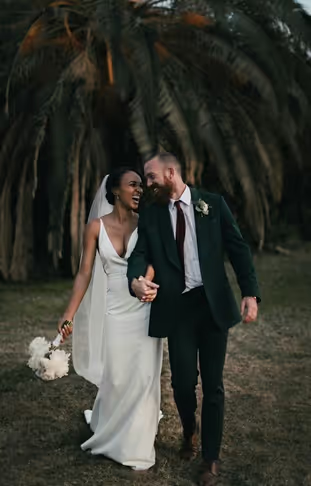
Think of it as a VIP experience for your favorite people. It makes booking easy for your guests and ensures they’ll all be staying nearby, which is perfect for post-reception hangouts, morning-after brunches, or just corralling everyone for the shuttle bus.
Is There a Difference Between a Regular Room Block and a Wedding Room Block?
Yes, there is a subtle but meaningful difference. A room block is a general term that could apply to any group needing rooms, such as business travelers, sports teams, or family reunions. A wedding room block is a bit more curated. Hotels know these bookings are tied to a major event, so they’re usually more flexible with amenities and perks. Some might offer extras like bridal suites, welcome bags at check-in, or a courtesy shuttle to your venue.
Hotels often treat wedding room blocks with more attention because they understand how important the weekend is to you and your guests.
Does It Cost Money to Block Hotel Rooms?
Not always. There are two common types of room blocks to be aware of:
Courtesy block – This is the more relaxed option. You reserve a set number of rooms, and the hotel holds them for your guests until a specific date. If your guests don’t book all of them, you are not financially responsible for the unbooked rooms.
Guaranteed block – With this arrangement, you commit to filling a certain number of rooms. If the rooms aren’t booked, you may be responsible for paying for the unused ones. This approach is more common with smaller hotels or during peak travel dates.
Some hotels require a contract for either type of block, so be sure to read the fine print carefully. If you are working with multiple hotels or negotiating a large block, having help with the logistics can make the process a lot smoother. If you use a room block service like Engine, you'll have access to a free RFP tool that will blast your request to all of the hotels you selected at once, rather than one at a time manually.
Will We Get Better Hotel Rates With a Room Block?
Yes, in most cases. Hotels offer discounted group rates as an incentive to fill multiple rooms at once. These rates are generally better than what individual guests would get by booking on their own, especially during peak seasons or in high-demand areas.
Having a room block can also shield your guests from price increases. Without a block, hotel rates may rise as your date gets closer, especially if there are other major events in town that weekend.
How Far in Advance Should I Reserve the Rooms?
The earlier, the better. There are two main things to consider when it comes to this question. The first thing is to consider how popular your wedding's geographical area is. For example, a room block in Hawaii for a few hundred guests will need to be booked far in advance as Hawaii has very high hotel demand and the "slow season" in Hawaii isn't really all that slow at all.
The second thing to consider is the size of your guest list. If you need to block 10 or 20 rooms, shouldn't be a big deal. However, if you need a block of 200 rooms, you're going to need to request it pretty far out. Further, if you need a block of 200 in a high-demand city like Honolulu or Washington D.C., you'll need to book them even further out.
Here’s a general timeline:
- Nine to twelve months before the wedding: Begin researching hotels and contacting them about room blocks.
- Six to nine months out: Finalize and sign your hotel contracts.
- Three to four weeks before the wedding: This is typically the cutoff date for guests to book rooms at the group rate.
Remember, if your wedding falls during a busy travel season or in a hot tourist destination, you may need to start the process even earlier to secure availability.

How Many Rooms Should I Reserve for My Wedding Guests?
This depends on your guest list, the percentage of guests traveling from out of town, and whether you are hosting a multi-day celebration.
Here’s a good way to estimate:
- Determine how many guests are likely to need overnight accommodations.
- Estimate that about 50 to 70 percent of those guests will book within your room block.
- Divide that number by the average number of people per room, and round up slightly to be safe.
For example, if you are inviting 150 people and expect 60 percent will need hotel rooms, that’s 90 guests. Assuming most rooms are shared by two people, you would want to reserve around 45 rooms. Some couples choose to reserve blocks at two hotels to give guests options at different price points.
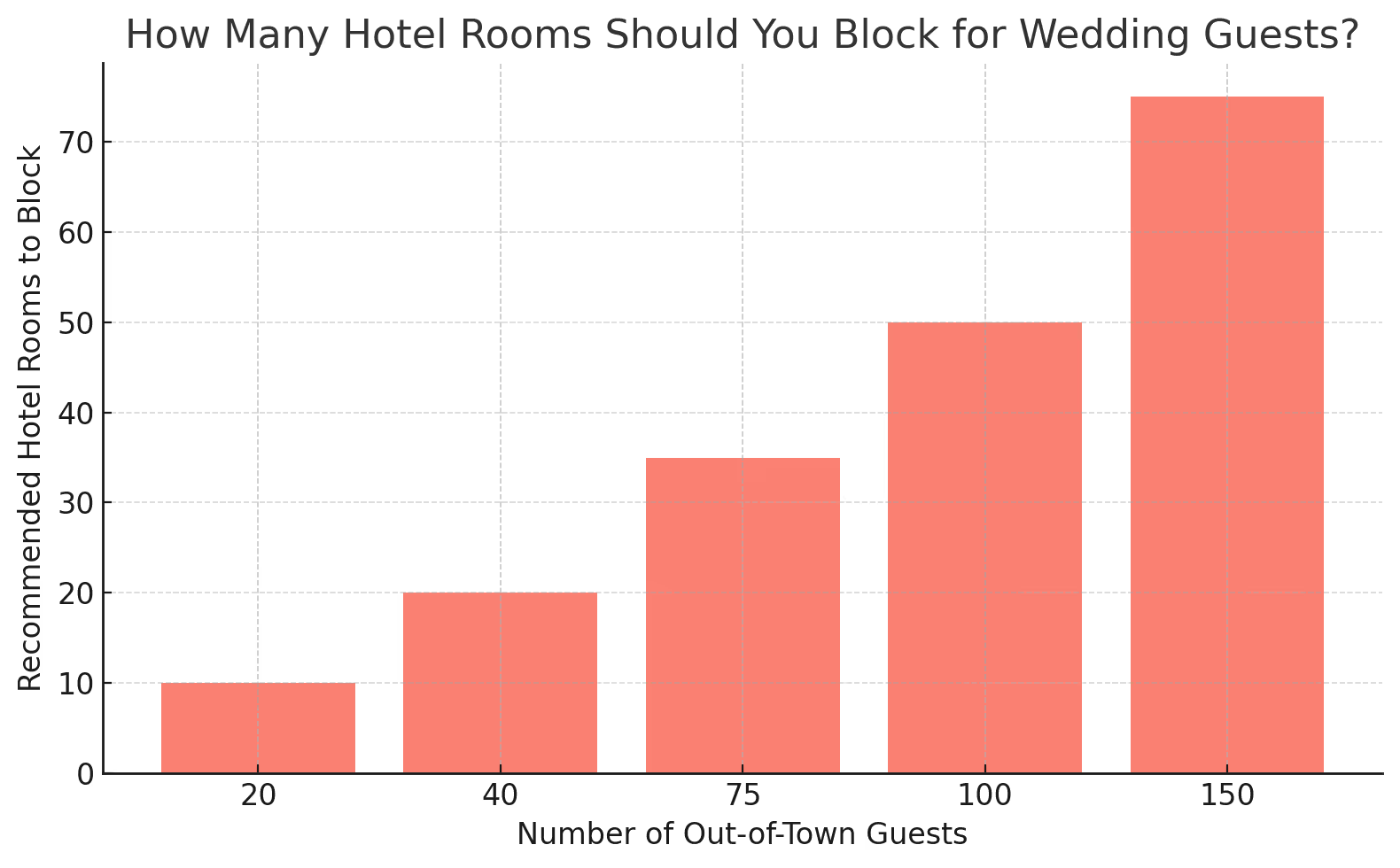
What If Some of the Reserved Rooms Aren’t Used?
If you have a courtesy block, unused rooms are released back to the hotel after the booking deadline, and you are not responsible for them financially. This is why many couples prefer this type of arrangement.
If you signed a guaranteed block, you could be on the hook for some or all of the unbooked rooms. Look for an attrition clause in your contract. For example, an 80 percent attrition clause means you are only responsible for filling 80 percent of the rooms you reserved. If you fall short, you may have to pay for the difference.
Always ask hotels for flexibility and clarify the cancellation or attrition policy before signing anything.
Who Pays for the Room Block? Me or My Guests?
Generally, your guests pay for their own rooms. You are simply securing the block and making it easier for them to book at a discounted rate. The block is a courtesy to your guests, not a financial obligation on your part.
That said, some couples do choose to cover rooms for close family members or wedding party members. If you plan to do this, coordinate directly with the hotel so you can prepay or provide a credit card authorization for those specific rooms.
Make sure your wedding website includes clear booking instructions. Provide the hotel name, group code, booking deadline, and a link if one is available.
Final Thoughts
A hotel room block is one of the smartest things you can do to make your wedding weekend more enjoyable and convenient for your guests. It helps keep everyone together, reduces stress, and even saves your friends and family some money.
Start early, ask the right questions, and make sure you understand your contract terms. With the right planning, securing a room block can be one of the simplest and most rewarding parts of your wedding logistics.
Once you get this step taken care of, you can go back to obsessing over flowers, playlists, and dessert tables. Because let’s be honest, that’s way more fun.

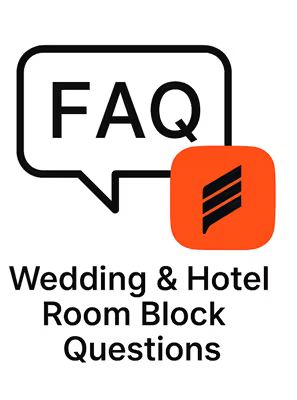
Wedding Room Blocks FAQ
Question - What is an RFP?
Answer - An RFP stands for Request for Proposal and it's basically a document you send to hotels offering your intention to reserve a block of hotel rooms. You explain your lodging needs, dates, expected guest count, and so fourth. The hotel then puts together an estimate for your request and sends it back. Often times you can negotiate back and fourth with the hotel and request room upgrades, free perks, or better rates. Essentially, you can use the size of your group to leverage extra concessions from the hotel. Often times, the bigger your group's size the better concessions you can negotiate for. While we are on this topic, we actually built a tool for sending bulk RFPs and this would be a perfect time to promote it.
Question - Do all hotels offer room block reservations?
Answer - Short answer is no, not all hotels. However, most do have some type of group or block options. Depending on the hotel and the destination city, you may not enjoy big discounts. Typically, higher tourist destinations like Las Vegas and Hawaii will get much less motivated by your groups size. Or rather, the size of your group will have to be pretty large to get the hotels motivated to offer great rates and nice perks. On the flip side, if you're going to need a room block in a run-of-the-mill small to mid-size city, you'll be able to swing your weight around a bit more, so to say. Think of it as a "small fish big pond" vs "small pond big fish" type situation. The hotels in Vegas or Miami will be much less moved by your 10 room block request.
Question - What type of savings can we expect on a room block vs typical hotel room rates?
Answer - This is highly dependent on many factors. Main factors to consider are the season in which your wedding will be taking place, how big of a tourist hub your wedding venue is, and the size of your guest list. Normally, you can expect anywhere from a 5% discount all the way up to 20% or more. In addition to room rate discounts, you can often times secure free upgrades and perks from the hotel. Free shuttle service, free meals, late check-outs, and room upgrades are all very common concessions hotels offer for group bookings.




.jpg)




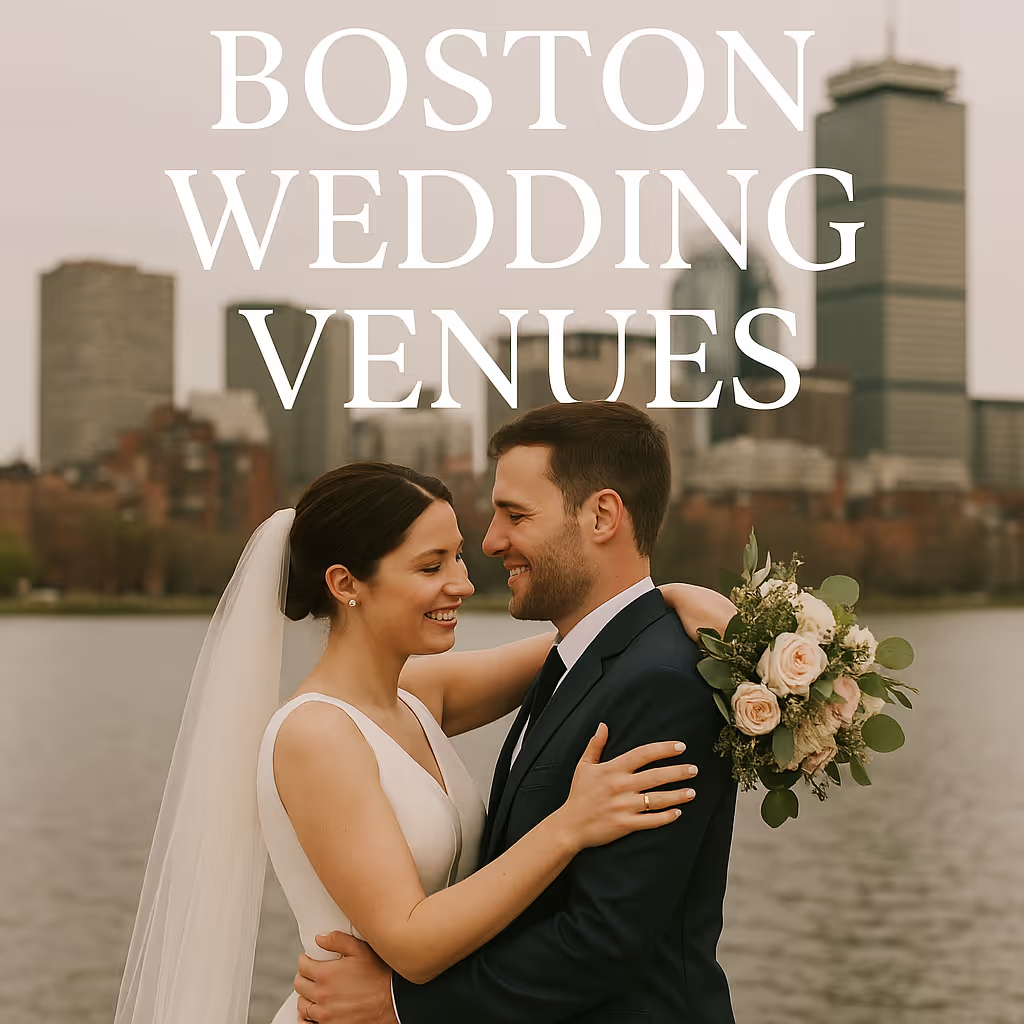



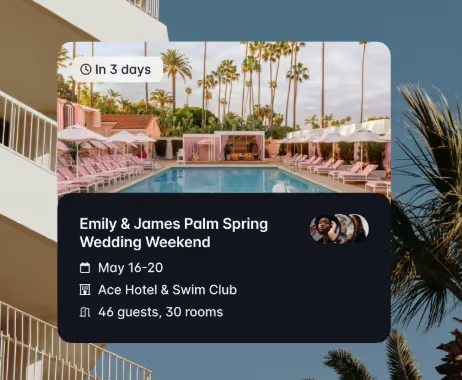


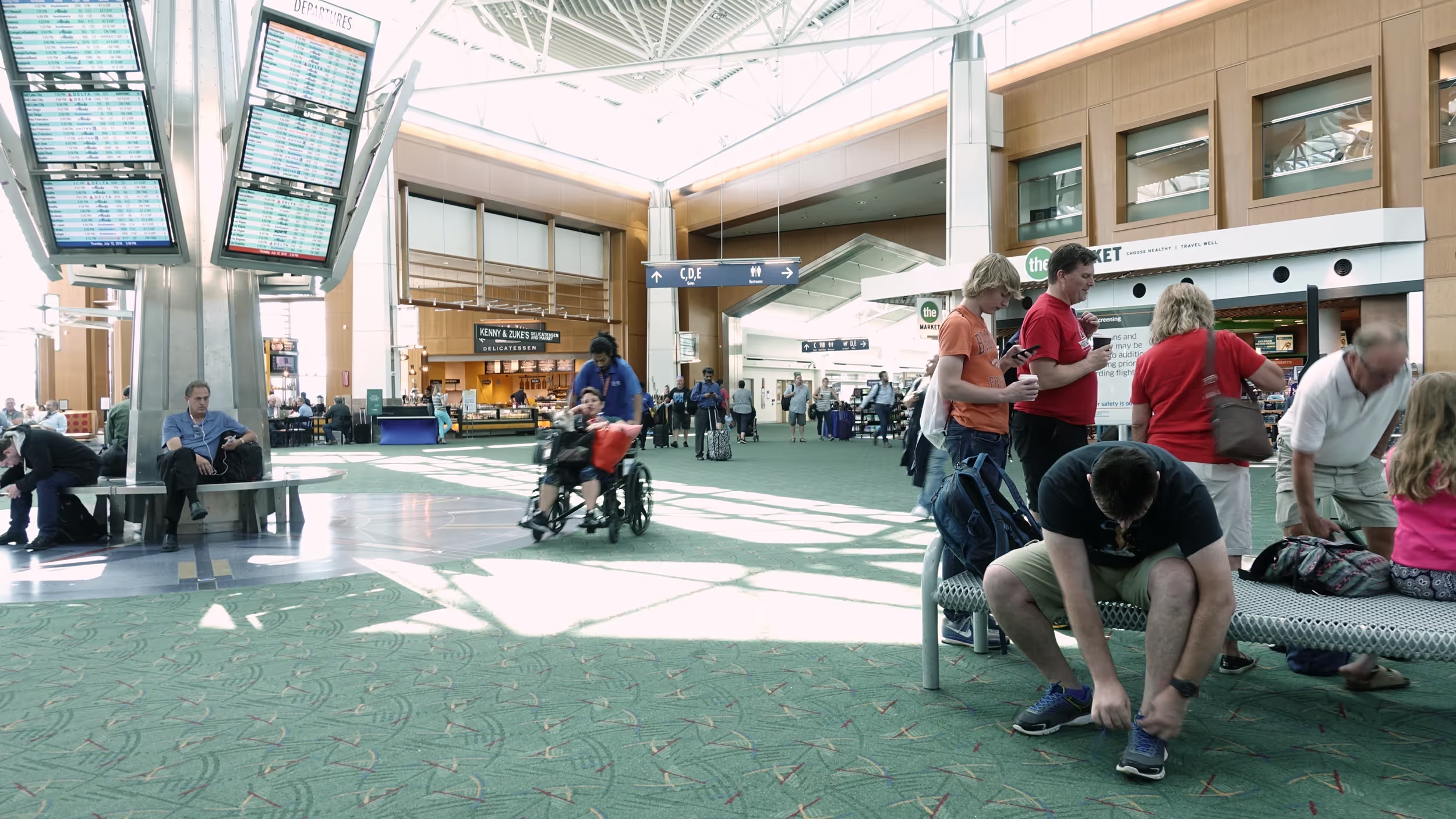
.avif)


.avif)






.avif)






.avif)

![What is an OBT? [+ Why They Matter]](https://cdn.prod.website-files.com/66a41388b1be9ba182f1e80c/66f97c4190ac5e26bea90c05_66a41388b1be9ba182f1efc0_online-booking-tool.avif)
.avif)

